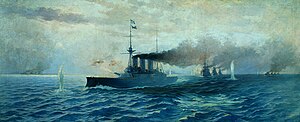Battle of Elli
This article needs additional citations for verification. (November 2010) |
| Battle of Elli | |||||||
|---|---|---|---|---|---|---|---|
| Part of the First Balkan War | |||||||
 Battle of Elli, Vasileios Hatzis. | |||||||
| |||||||
| Belligerents | |||||||
|
|
| ||||||
| Commanders and leaders | |||||||
|
|
| ||||||
| Strength | |||||||
|
1 armoured cruiser 3 ironclad battleships 4 destroyers |
3 battleships 1 ironclad 1 protected cruiser 4 destroyers | ||||||
| Casualties and losses | |||||||
| 2 killed |
18 killed 41 wounded 1 battleship damaged[1] | ||||||
The Battle of Elli (Greek: Ναυμαχία της Έλλης, Turkish: İmroz Deniz Muharebesi) or the Battle of the Dardanelles took place near the mouth of the Dardanelles on 16 December [O.S. 3 December] 1912 as part of the First Balkan War between the fleets of the Kingdom of Greece and the Ottoman Empire. It was the largest sea battle of the Balkan Wars.[2]
Background
Since the start of the war the
Royal Hellenic Navy acted aggressively, while the Ottoman Navy remained in the Dardanelles. Rear Admiral Pavlos Kountouriotis landed at Lemnos
, while the Greek fleet liberated a series of islands. On 24 October (O.S.), Kountouriotis sent a telegram to the Ottoman admiral: "We have captured Tenedos. We await the exit of your fleet. If you need coal, I can supply you." On 3 December (OS), the Ottoman fleet left the Dardanelles.
Battle
The Royal Hellenic Navy, led by Kountouriotis on board of the flagship
Barbaros Hayreddin, thus forcing the Ottoman fleet to retreat in disorder. The Greek fleet, including the destroyers Aetos, Ierax and Panthir
continued to pursue the Ottoman fleet off-and-on between December 13 and December 26, 1912.
Aftermath
The Ottomans suffered 7 killed and 14 wounded on the Barbaros Hayreddin, 8 killed and 20 wounded on the
This victory was quite significant in that the Ottoman Navy retreated within the Straits and left the Aegean Sea to the Greeks who were now free to liberate the islands of
Samos
and others. It also prevented any transfer of Ottoman troop reinforcements by sea and effectively secured Ottoman defeat on land.
See also
- Greek cruiser Elli (1912)
- Greek cruiser Elli (1935)
- Greek frigate Elli (F450)
References
- ^ ISBN 0-85177-610-8.
- ISBN 978-0415229463.
Further reading
- Erickson, Edward J.; Bush, Brighton C. (2003). Defeat in Detail: The Ottoman Army in the Balkans, 1912–1913. Greenwood Publishing Group. ISBN 0275978885.
- Fotakis, Zisis (2005). Greek Naval Strategy and Policy, 1910–1919. Routledge. ISBN 978-0-415-35014-3.
